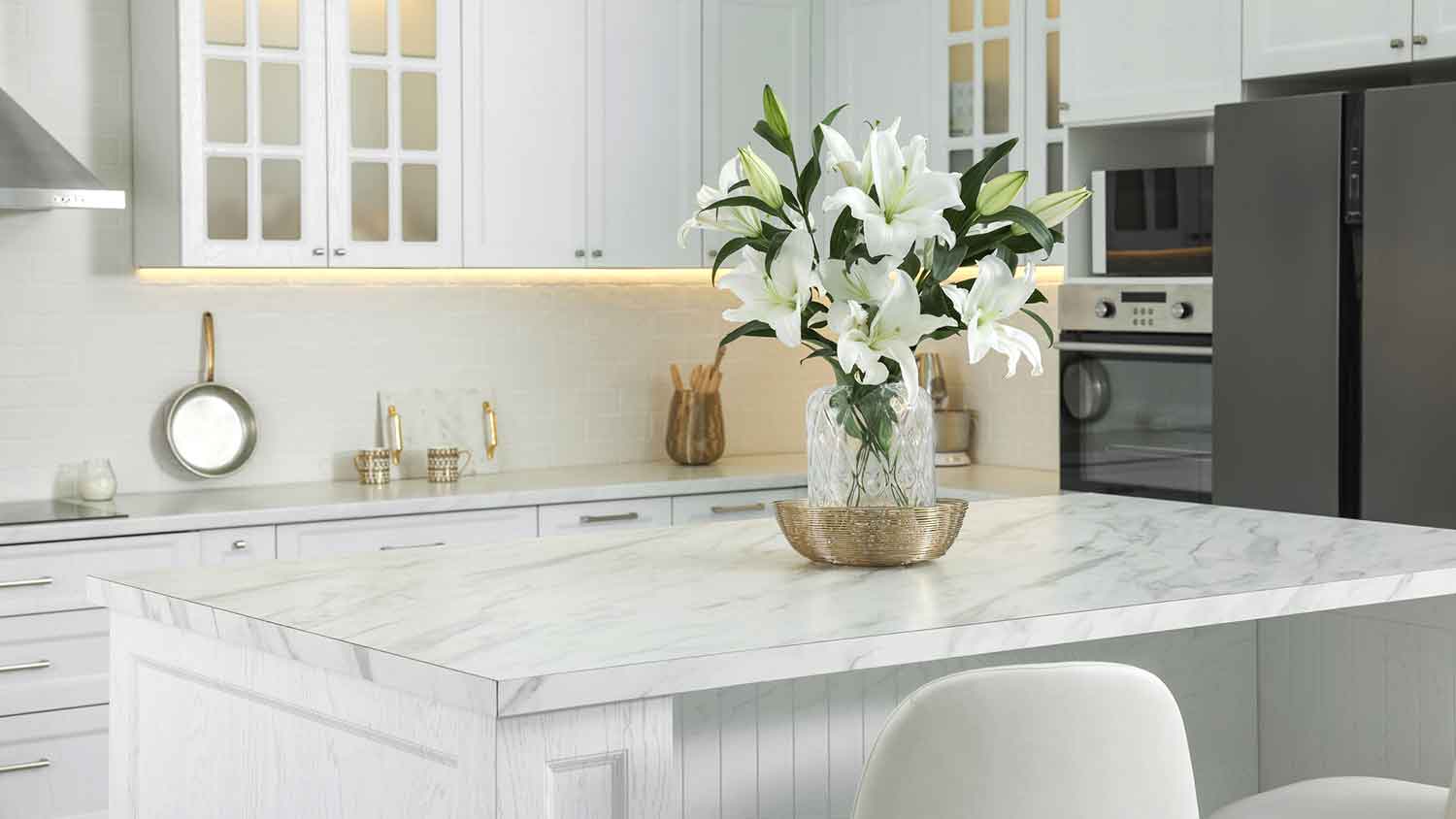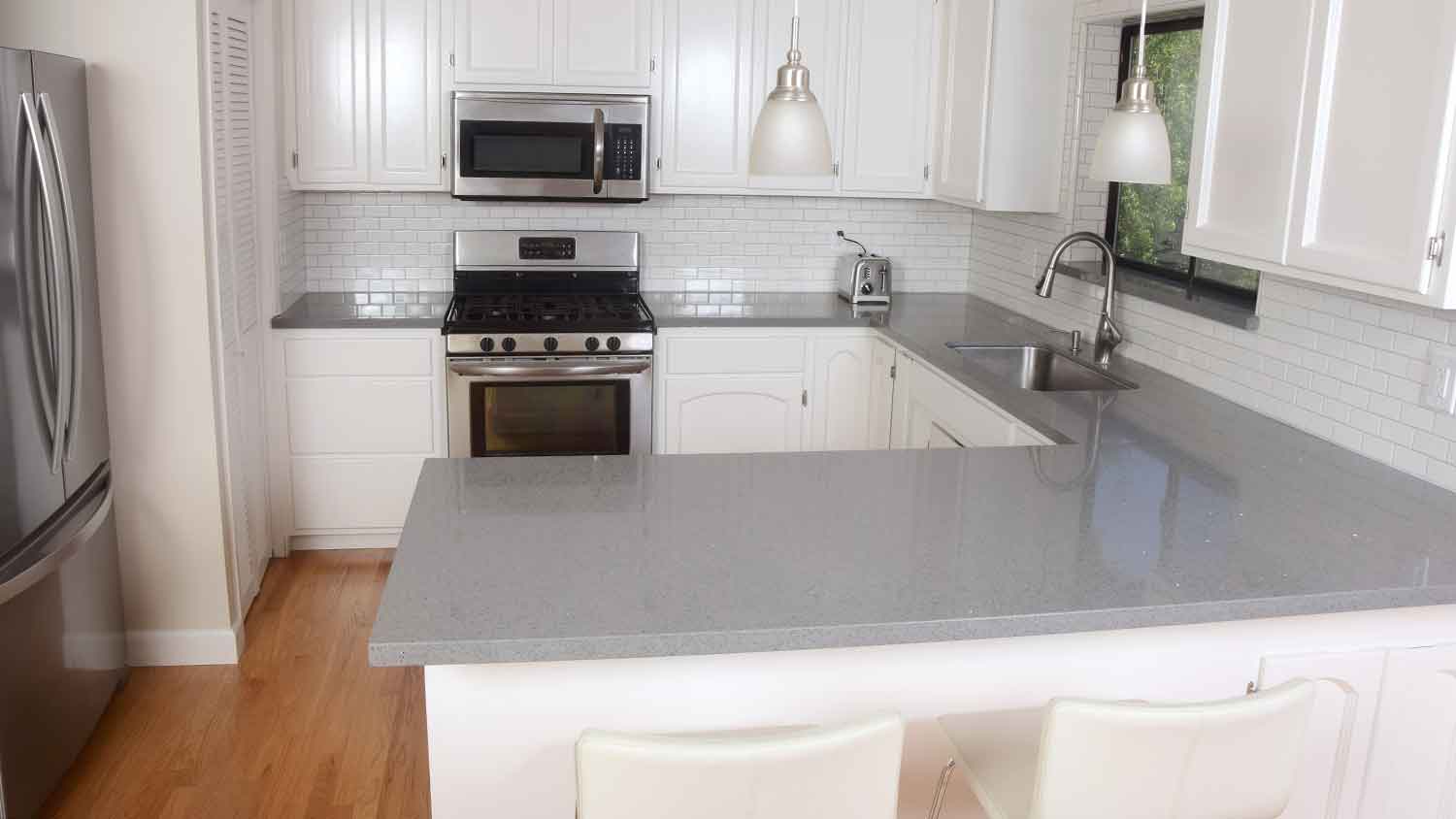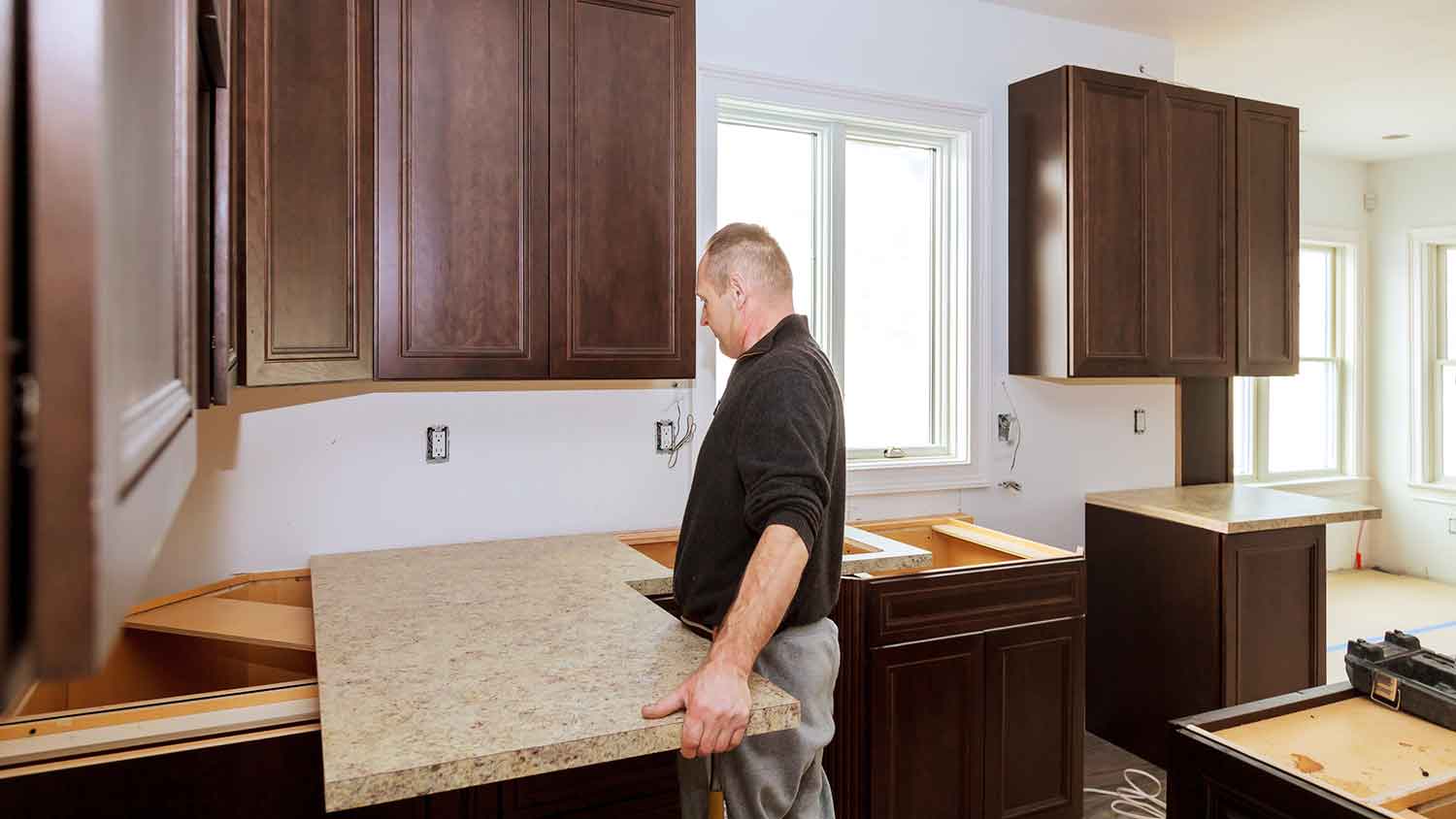
Butcher block countertops are a popular and durable choice for active kitchens. Learn how much it costs to install butcher block counters and what factors may affect pricing.
These materials may mimic natural stone, but there’s no faking their different benefits


Quartz is a type of engineered stone made from ground natural quartz.
Laminate is a composite material made with plywood and decorative paper.
Laminate is known for affordability, versatility, and ease of installation.
Quartz is known for durability, longevity, and its stone-like appearance.
If you’re looking to remodel your kitchen, you might be weighing the differences between laminate and quartz countertops. Homeowners love these two countertop materials for entirely different reasons. On the one hand, you have affordability; on the other, you have staying power. Which one is better for your home depends on your needs.

In many ways, laminate and quartz countertops couldn’t be more different. They’re both generally durable, stain resistant, and low-maintenance. They both mimic natural stones, with laminate having options ranging from colorful patterns to wood grain, but they have entirely different constructions, strengths, and weaknesses. This makes laminate the champion of affordability and versatility, while quartz is a premium product that lasts for years to come.

Laminate is a composite surface material first introduced in 1977 by the Swedish company Perstorp. Like other laminar composite materials, it consists of multiple layers:
A base layer typically made from MDF particleboard, plywood, or fiberboard. This layer gives laminate its structure.
A printed image layer made from decorative paper gives the laminate its look.
A wear layer of transparent melamine-based synthetic coating protects the bottom layers.
In some cases, it may also have an additional layer to help with moisture resistance and sound. Though laminate has a range of pros and cons, this product is extremely popular because it’s wallet-friendly, easy to maintain, and relatively durable.
| Pros | Cons |
|---|---|
| Budget-friendly | Susceptible to water damage |
| Easy to clean | Cannot be repaired or resealed |
| Stain resistant | Prone to scratches and wear |
| Wide range of styles and designs | Susceptible to heat damage |
Best for:
Kitchen remodels on a budget
People who like bright colors or quirky designs
Handy homeowners who want to DIY their remodel
If you’re looking for kitchen countertop ideas on a budget, look no further than laminate. These countertops are some of the most affordable on the market. They’re also extremely easy to maintain. Just wipe up spills quickly and clean with a little soap and water. Laminate has a nearly limitless number of design options, making it a good fit for virtually any home.
Though laminate countertops generally hold up well to regular use, they do have weak spots. Moisture is a notorious issue. Though the wear layer is nonporous, water can seep below the seams and warp the layers below. Knives can scratch through the wear layer, and hot pots can leave scorch marks. This type of damage is extremely difficult to fix, and you’ll have to replace the damaged section most of the time.

Quartz is technically a natural stone, but quartz countertops are actually a man-made product. This engineered stone consists of finely ground quartz dust, resins, and pigments. Quartz countertops typically contain 90% to 95% natural stone, while certain designs may also include glass, mirror pieces, or other minerals.
During manufacturing, this mixture is poured into a mold and pressed, which gives the slab its shape and strong construction. The end result is a material similar to a natural stone with added strength.
| Pros | Cons |
|---|---|
| Extremely durable | Susceptible to heat damage |
| Nonporous | Difficult to install |
| Realistic color and design options | High upfront costs |
| Low-maintenance | May require cabinet reinforcement |
Best for:
Those looking for a natural stone look without the maintenance
High use kitchens and bathrooms
Homeowners who value longevity
Quartz countertops are the best of both worlds. You get a realistic natural stone look with all of the benefits and strength of resins. This material is extremely durable with high abrasion resistance. It’s nonporous, so the maintenance is very low. You won’t need to reseal it, and it’s not prone to staining.
Quartz is an investment—and it costs more than other popular countertop materials like butcher block and laminate. It’s also difficult to install because it comes in heavy slabs. You may need to reinforce your cabinets and flooring to prevent damage, and though it looks like a natural stone, it isn’t. This material is still vulnerable to heat damage from hot pots and pans.
Below are comparisons of these two countertop materials so you can see how they stack up.
Quartz is a higher-end material that comes with a higher-end appearance. The patterns extend through the entire thickness of the countertop, giving quartz a more convincing stone-like look than laminate.
With laminate, patterns are only surface-level. Over time, the patterned layer can peel up or scratch. That said, laminate does have a wider range of options, including primary colors, decorative patterns, and wood grains.
Laminate reigns supreme when it comes to options and customization. The pattern you see on laminate is actually a printed piece of decorative paper. This means the design options are virtually limitless. Formica® even offers custom-printed designs. Consult a laminate countertop installer near you to see the full range of options.
On top of that, laminate is lightweight and easy to cut. Quartz, on the other hand, is heavy and difficult to cut.
If you’re looking at laminate versus quartz countertops, quartz is far more durable. Laminate is notoriously vulnerable to water damage, while quartz is waterproof. Quartz is abrasion-resistant, while laminate is prone to scratches. That said, both materials cannot sustain heat damage from hot pots or pans, so always use a trivet.
Some kitchen countertops are better suited for specific households. For example, if you have children and frequent spills happen, choose a nonporous material like quartz. A countertop installer can help you decide how durable the counter needs to be for your kitchen.
These materials are on two opposite ends of the price spectrum. Laminate is one of the most inexpensive types of countertops on the market, while quartz is more of an investment. The average laminate countertop costs about $1,240, while the average quartz countertop costs $4,500. That’s a difference of more than $3,000.
If you want to save money on quartz, keep the brand in mind. Corian® countertops costs are often less than Silestone® countertops (although Corian® is a brand of solid surface). It just depends on the exact specs.

No countertop installation is a beginner-level DIY, but laminate countertops are one of the easiest countertops to install. The simplest way is to purchase a post-form laminate countertop, which comes in standard sizes with an integrated backsplash.
Quartz, on the other hand, typically requires professional installation. The weight makes it difficult to work with, and your contractor will need to cut the slab similar to how they’d cut a granite countertop.
Quartz countertops are generally easier to repair than laminate countertops. Most homeowners can fill small chips with a quartz-compatible epoxy adhesive or buff out minor scratches with sandpaper.
In many cases, the only way to repair laminate is to replace the damaged laminate. Some homeowners choose to mask imperfections by painting their laminate countertops, but it also covers up the existing pattern.
Both types of countertops are relatively low maintenance, but you may find that laminate countertops are slightly more work. You’ll need to wipe up spills immediately to prevent staining and water damage. Laminate is also prone to scratches, so it may require more frequent repairs.
Since both materials have nonporous surfaces, you can easily wipe them clean using a nonabrasive sponge with mild soap and water.
Longevity may be the biggest difference between quartz and laminate. Laminate countertops last about 20 to 30 years but can start showing major signs of wear after 15 years. Quartz countertops can last a lifetime. Even when they start to look worn, you can refinish them the same way you’d refinish natural stone.
Laminate countertops contain high levels of adhesives and sealers, which are a source of volatile organic compounds (VOCs). Most notably, in 2016, the Centers for Disease Control and Prevention (CDC) released test results revealing that certain laminate flooring that originated in China produced harmful levels of formaldehyde. Formaldehyde is categorized as a probable carcinogen by the Environmental Protection Agency (EPA), according to the National Cancer Institute. So, if you do choose laminate, go for a low-formaldehyde variety.
Quartz, on the other hand, is more sustainable for several reasons. This material mostly consists of natural quartz crystals; some varieties even utilize recycled materials. In addition, it has a longer life span than laminate, so you won’t need to replace them as often.
Laminate countertops have virtually no resale value, even if you choose higher-end Formica® countertops. Quartz countertops, on the other hand, can help attract buyers. This is especially true if you choose a high-end brand like Silestone®.
Installing countertops costs anywhere from $1,850 to $4,450, with an average price of $3,140, depending on material, type, and size. Laminate is one of the most budget-friendly countertop materials at $8 to $27 per square foot, while quartz costs $15 to $70 per square foot. Labor typically accounts for 10% to 20% of the total project cost.
Installing countertops is a tricky business, and mistakes can be costly, so we recommend hiring a local countertop installer. These contractors are well-versed in what can go wrong when installing countertops and can complete every aspect of the project, from cutting and assembly to sealing. Going the DIY route is appropriate in certain scenarios, such as a simple prefabricated laminate design.
Marandos painting was fantastic! He's done both my interior and exterior painting and did a phenomenal job. Gave very great pricing as well. I would highly recommend him for any painting job.
I have never had a better experience with a person/business in construction. They communicated well, understood the project, and executed it efficiently, and with excellent care and craftsmanship. I would highly recommend Topnotch for my future needs; in fact I already have them lined up...
So Happy!!! I really needed the help cleaning floors and such in my home. Angelica and her crew did a great job and I will have them again about every two weeks. Very kind and thoughtful workers. I am so glad to be on the schedule.
Hard working, good communicators and very easy to work with. My pole building is good to go for another 30 years, thanks to Chris, Clark and Shane. Two thumbs up from me!
We had one oven and a bunch of random junk that needed to go, but we didnâ t know how we were supposed to dispose of it all. Justin made the whole experience so fast and easy for us. We thought we would need to help him load a couple heavy things but before we knew it he had it all in his...
They did a good job and were professional and nice people to work with. They poured retaining wall and excavated and poured a concrete driveway.
Friendly, easy to work with and willing to go the extra mile to make sure the project is satisfactory and completed in a timely manner. Used flooring protection in all traffic areas, cleaned up everything when project was done and work was completed with meticulous attention to detail. I very...
Great communication and work looks great. Overall a very pleasant experience!
worked with me on prices and got the job done that day after hours work and was outstanding guy and work!!
This company was awesome to work with. Prompt to meet for a bid, Once hired, he and his team were quick to get the job done. He went above and beyond on cleaning up the area once the work was completed. I will recommend and use again if I find the need.
From average costs to expert advice, get all the answers you need to get your job done.

Butcher block countertops are a popular and durable choice for active kitchens. Learn how much it costs to install butcher block counters and what factors may affect pricing.

Discover the cost of installing laminate countertops, including how their size, material, and finish impact your total price.

If you’re looking to refinish your countertops, epoxy will make them shine for years to come. This guide will help you budget for epoxy countertop costs.

Butcher block counters are a cost-effective and beautiful option. Learn the butcher block countertop pros and cons to see if they’re right for your kitchen remodel.

Laminate countertops are not heat resistant, so if you’ve left a burn mark, here’s how to fix a burnt countertop to make it look great again.

If your countertops are getting old, dull, or showing signs of wear, it may be time to do something. But to refinish vs. replace countertops is the question.